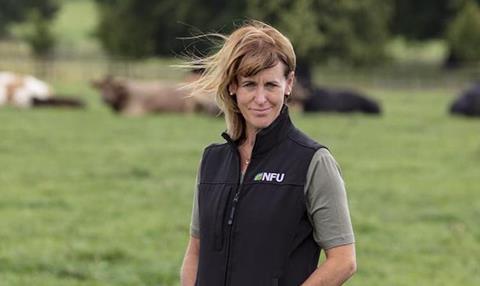NFU president Minette Batters has commended the Trade and Agricultural Commission's (TAC) "bold vision," in a new report which was published on 2nd March.

She said: “The NFU has long argued how important it is to properly examine, and to try to reconcile, the complexities and tensions inherent in Government trade policy – one that seeks both to liberalise trade and to safeguard our high food and farming standards and our valued British farming sector. The report does this very well and I thank all of the Commissioners, in particular the chairman Tim Smith, for their work over the past eight months.
“It’s clear from the report that there is a tough balance to be struck between doing trade deals on the one hand and safeguarding our high standards of food and farming on the other. This report dispels the notion that it is easy, which is the message UK farmers and the British public have too often been given.
“I commend the Commission for setting out a bold vision to manage those tensions, growing our exports and improving our competitiveness while continuing to meet the high expectations of UK consumers for high quality, sustainably-produced food. But the report is also clear that this will involve trade-offs and difficult decisions and that there will be winners and losers as the government pursues its new, independent trade policy."
The principles
According to the report, the UK should aim to:
- Promote the liberalisation of trade, to positively influence innovation and productivity, and price and choice for consumers.
- Prioritise a thriving domestic agri-food sector supported by complementary domestic and trade policies.
- Ensure that agri-food imports meet relevant UK and international standards on food safety and biosecurity.
- Match tariff-free market access to relevant climate, environment, animal welfare and ethical standards, remedying competition issues arising where permitted imports do not meet relevant UK and international standards.
- Lead change, where needed, to the international framework of rules on trade and relevant standards, to address the global challenges of climate change and environmental degradation.
- Support developing countries in accessing the full benefits of the global trading system.
Batters continued: “Ultimately, how those trade-offs are managed and weighed remains a decision for ministers and it is vital that the Government now sets out, without delay, how it intends to accommodate these recommendations within a trade strategy that works for UK farmers and consumers alike.
“There are many good recommendations in the report that the Government should adopt, in particular the need for a coherent and explicit trade strategy."
“At its core such a strategy must contain a clear commitment to support our farmers in producing food to the highest standards of animal welfare and environmental protection, in leading the world in climate-friendly farming and in remaining the beating heart of our rural communities. I am pleased to see such an approach reflected in the Commission’s deliberations.
“There are many good recommendations in the report that the Government should adopt, in particular the need for a coherent and explicit trade strategy encompassing both Free Trade Agreements (FTAs) and general trade policy, an approach to imports that has our high standards of production at its core, and a Food and Drink Exports Council to foster a collaborative and targeted approach to growing markets overseas.
“Of course, this is only the start of the next stage of the journey. We look forward to the Secretary of State setting out her detailed response to the report very soon and we also await the operational details of the Statutory TAC which will follow up this work, scrutinising trade deals before they are ratified.
“The Commission has set the stage for government to develop its trade policy in a way that puts the UK at the forefront of more sustainable models of production and consumption both here and across the world. I hope the government seizes that opportunity with both hands.”
This story was originally published on a previous version of the Meat Management website and so there may be some missing images and formatting issues.












